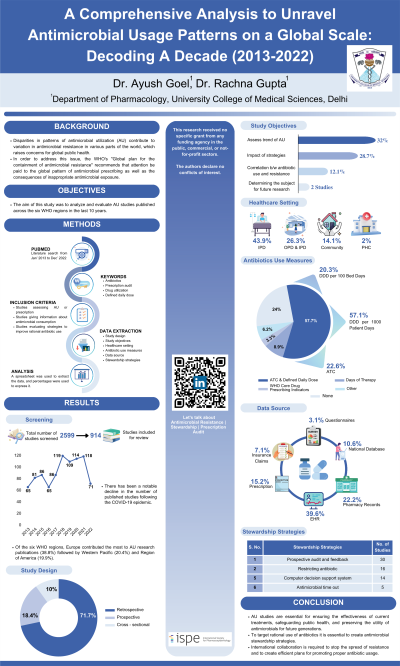Infectious diseases, vaccines and treatments
Session: Poster Session A
(227) A Comprehensive Analysis to Unravel Antimicrobial Usage Patterns on a Global Scale: Decoding A Decade (2013-2022)
Monday, August 26, 2024
8:00 AM - 6:00 PM CEST
Location: Convention Hall II


Ayush Goel, MBBS
Junior Resident
University College of Medical Sciences
Delhi, India- RG
Rachna Gupta, MBBS, MD
University College of Medical Sciences, India
Presenting Author(s)
Co-Author(s)
Background: Disparities in patterns of antimicrobial utilization (AU) contribute to variation in antimicrobial resistance in various parts of the world, which raises concerns for global public health. In order to address this issue, the WHO's "Global plan for the containment of antimicrobial resistance" recommends that attention be paid to the global pattern of antimicrobial prescribing as well as the consequences of inappropriate antimicrobial exposure.
Objectives: The aim of this study was to analyze and evaluate AU studies published across the six WHO regions in the last 10 years.
Methods: A literature search for AU studies was carried out on PubMed to identify studies published from 01 Jan '2013 to 31 Dec’2022. Studies were selected if they were in English language, assessing AU or prescription practices, giving information about antimicrobial consumption or evaluating interventions to improve antimicrobial prescribing practices. Data was extracted to analyze methods of reporting AU, study objectives, study design, source of data, findings, and suggestions for rational use of antimicrobials across the globe.
Results: The search revealed 2599 studies of which 914 were included. Drug utilization studies to assess the trend of AU were the most common (32%). Antimicrobial use and its relation to resistance was assessed in 12.1% studies, while only 2 studies focussed on determining the subject for future research. More than half of the studies (57.6%) used the ATC/DDD system, of which 77.4% of the study used DDD indicators. Only 30 studies (3.3%) utilized the WHO core indicators to evaluate antimicrobial prescription patterns. Of the six WHO regions, Europe contributed the most to AU research publications (38.8%). Only 14.1% of these studies were community-based, whereas the rest were hospital-based (IPD = 43.9%, both IPD & OPD = 26.3%, OPD = 13.7%). Retrospective study design was most common (71.7%). Medical records (32.6%) and patient prescriptions (15.2%) were utilized to calculate AU and consumption. Call for the implementation of a policy or actions to enhance rational drug use and prescribing practices was the most common conclusion (48.7%).
Conclusions: Drug utilization studies (DUS) are crucial for the appropriate use of antibiotics and for decision-making and resource allocation. To target rational use of antibiotics and hence lower antibiotic resistance, it is essential to carry out more DUS in communities and create antimicrobial stewardship strategies. International collaboration is required to stop the spread of resistance and to create efficient plans for promoting proper antibiotic usage in all nations.
Objectives: The aim of this study was to analyze and evaluate AU studies published across the six WHO regions in the last 10 years.
Methods: A literature search for AU studies was carried out on PubMed to identify studies published from 01 Jan '2013 to 31 Dec’2022. Studies were selected if they were in English language, assessing AU or prescription practices, giving information about antimicrobial consumption or evaluating interventions to improve antimicrobial prescribing practices. Data was extracted to analyze methods of reporting AU, study objectives, study design, source of data, findings, and suggestions for rational use of antimicrobials across the globe.
Results: The search revealed 2599 studies of which 914 were included. Drug utilization studies to assess the trend of AU were the most common (32%). Antimicrobial use and its relation to resistance was assessed in 12.1% studies, while only 2 studies focussed on determining the subject for future research. More than half of the studies (57.6%) used the ATC/DDD system, of which 77.4% of the study used DDD indicators. Only 30 studies (3.3%) utilized the WHO core indicators to evaluate antimicrobial prescription patterns. Of the six WHO regions, Europe contributed the most to AU research publications (38.8%). Only 14.1% of these studies were community-based, whereas the rest were hospital-based (IPD = 43.9%, both IPD & OPD = 26.3%, OPD = 13.7%). Retrospective study design was most common (71.7%). Medical records (32.6%) and patient prescriptions (15.2%) were utilized to calculate AU and consumption. Call for the implementation of a policy or actions to enhance rational drug use and prescribing practices was the most common conclusion (48.7%).
Conclusions: Drug utilization studies (DUS) are crucial for the appropriate use of antibiotics and for decision-making and resource allocation. To target rational use of antibiotics and hence lower antibiotic resistance, it is essential to carry out more DUS in communities and create antimicrobial stewardship strategies. International collaboration is required to stop the spread of resistance and to create efficient plans for promoting proper antibiotic usage in all nations.
